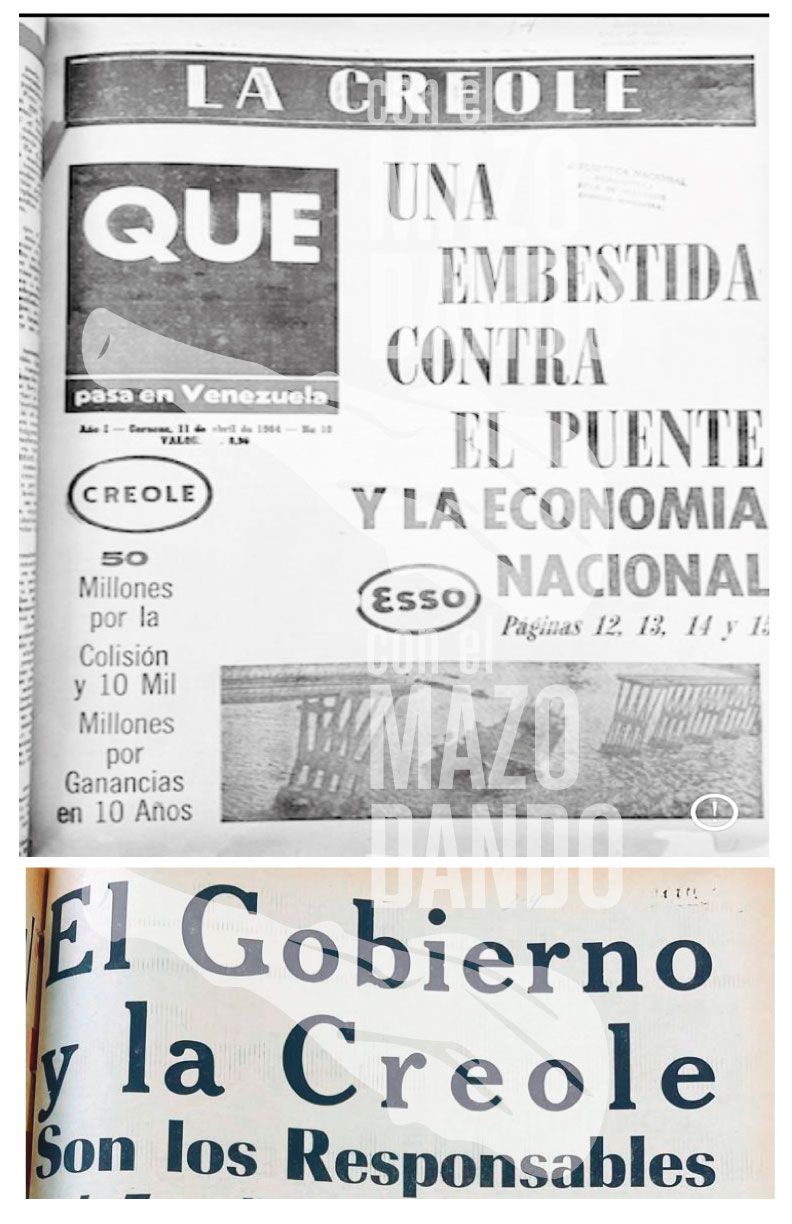THE TRAGEDY OF THE BRIDGE OVER THE LAKE 37 DEAD AND 20 MILLION LOST
Published at: 05/06/2024 09:00 PM
EXXON MOBIL'S CRIMES AGAINST NATURE AND HUMANITY IN VENEZUELA
(LA EXTRA, QUÉ, CLARÍN and ÉLITE, April 1964)
- Sixty years ago, the Creole Petroleum Corporation (Standard Oil), today Exxon Mobil, caused a tragedy in Venezuela whose toll of fatalities, damage to the environment and assets to the nation has been buried by media silence.
- When Rafael Poleo was a CIA agent, in the news program El Observador Creole, exactly on April 6, 1964, the tanker Esso Maracaibo hit columns 31, 32 and 33 of the Rafael Urdaneta Bridge over Lake, causing the death of 37 people, the spill of more than 59,000 barrels of crude oil and an estimated loss to the nation at that time at Bs 21 billion (U$D 4,883,372,093, oo).
- The tanker crashed into pile 31, in the Punta de Iguana sector, carrying 600 meters of concrete structure with it. Seven of the vehicles that were driving on the bridge rushed into the lake waters and all their occupants perished.
- The Creole Observer, and all the traditional press, concealed the seriousness of the events. The species began to spread to exonerate the transnational corporation, such as reducing the number of victims to only 8, and saying nothing about environmental damage and compensation to be paid to the Venezuelan State and the survivors of the victims.
- It was also discovered that the Esso Maracaibo, by the date of the tragedy, had already reported defects in its electrical equipment that made it impossible to navigate in and out of the lake. Thus, the cause of the deaths was due to the company's irresponsibility. The captain of the ship, Avelino González Sumalca, was used as a scapegoat for the unusual tragedy caused by Creole's negligence.
- The transnational company did not even publish a statement of solidarity with the victims and their families. Given the magnitude of the tragedy, Raúl Leoni's government did not claim damages or demand reparations.
- In the extensive Exxon Mobil file, we find:
- In 1944, General Isaías Medina Angarita declared persona non grata and expelled President La Creole from Venezuela, for promoting a coup d'etat in retaliation for the Hydrocarbons Act (fifty-fifty).
- A year later, General Medina was overthrown due to a coup plotted at the headquarters of the US embassy, led by Romulo Betancourt.
- Once again, Exxon Mobil was among the foreign economic factors that financed the April 2002 coup, and the Oil Strike, to prevent the implementation of the Hydrocarbons Enabling Act.
- Recently, Exxon Mobil has paid the professional fees of Guyanese government attorneys at the International Court of Justice to undermine Venezuela's rights to its claimed territory.
- Exxon has implemented the installation of gringo military bases and CIA commands in Guyana as a platform for the threat of war, siege and dispossession of our sovereignty.
- The main source of funding for the Venezuela Sales Command to support the claims of María Corina Machado and Edmundo González Urrutia comes from Exxon Mobil.
- Outside the national territory, on March 24, 1989, Exxon was the protagonist of the Exxon Valdez oil spill in the crystal clear waters of the Alaska Sea. Even today, damage persists to coasts and fishing areas that were contaminated by the spill of 10.8 million gallons of crude oil (37,000 tons), which killed millions of birds and marine species. Exxon only paid half of the compensation agreed by the court in the case, after a rigged out-of-court settlement.
- As a “war dog”, Exxon Mobil has financed arms trafficking to destabilize the republics of Angola and Chad in Africa.
- The Standard Oil-Exxon has always been owned by the Rockefeller family. At the time of Rómulo Betancourt, it was run by his friend “Roque”, Nelson Rockefeller, who under the protection of Miraflores built an immense monopoly that included: the CADA food distribution network, the Hotel Ávila, INDULAC Dairy Industries, Café El Peñón, Industrias Integradas S.A., the Daily Journal, Cementos Guayana and some large estates, whose most precious jewel was Monte Sacro, among others. poultry and livestock emporiums.

Mazo News Team